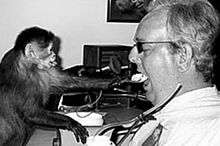National Telecommuting Institute
National Telecommuting Institute, Inc.[1] (NTI) is a 501 (c) (3) non-profit organization focused on placing Americans with Disabilities and Disabled Veterans in jobs since 1995. NTI is headquartered in Downtown Boston with virtual personnel across the United States. As the pioneers in the industry, NTI has initiated the evolution of telecommuting, helping Americans with Disabilities and has set the standards for a work-at-home environment for over 20 years.
Since the inception of NTI, the non-profit has expanded into 3 Divisions:
The Medical Transcription (MT) division was disbanded at the end of 2014.
The NTI@Home division is dedicated to placing Disabled Veterans and Americans with Disabilities in Work at Home positions. The primary roles NTI fulfills include Call Centers, Sales, Customer Service, Tier I and Tier II Help Desk roles for Fortune 500 companies such as IBM, Meijer, Amazon, and Sykes.[5] In addition, NTI has provided third party services to staffing agencies to help with their 508 needs. Not only does NTI supply the people, but the call center technology as well.
History


On June 23, 1995, NTI was started by the 3 founders, Dr. Paul Corcoran, Chairman of the Rehabilitation Department at the Tufts New England Medical Center; Dr. Mark Schlesinger, Chairman of Health Economics Department at Yale; and Dr. M.J. Willard, Behavioral Psychologist who had spent the prior 15 years working with individuals with severe physical disabilities function within their home environment.
Prior to NTI, Dr. Willard had spent three years as a research assistant to famed psychologist B.F. Skinner and concluded that his behavior-modification methods could be used to train monkeys to help the disabled. Dr. Willard then focused her efforts on a non-profit called Helping Hands:[6] Simian Aides for the Disabled which was started in 1977. She spearheaded the concept of assisting quadriplegics in daily tasks through the use of monkeys.[7]
In the early 90’s Dr. Willard further explored existing work opportunities for individuals with physical disabilities who wanted to work within their home. In her quest, Dr. Willard discovered that there was little done within the field. At the time, work at home positions were scarce and she was able to place individuals on a one on one basis. The original work at home positions consisted of appointment reminder calls for medical practices and hospitals, data entry, book indexing and medical or legal transcription services. However, Dr. Willard was faced with a dilemma having too many individuals with disabilities to place and not enough positions in the workforce that were at home positions.
With research funding from the Department of Education, Dr Willard interviewed experts in the area and those experts recommended that Dr. Willard look at the areas of Customer Service and the Call Center industry. The experts in the industry felt that these two fields would grow exponentially in terms of virtual environments.
30 years ago, within the Call Center industry, virtual Call Center agents did not exist and now the industry employees over 3 million Americans. Today, there are more agents than public school teachers and truck drivers in the country. Even though many of the Call Center positions have been offshored, they have expanded within the United States as well. Currently, between 5 and 10% of Call Center agents are currently working from their homes and experts are predicting the trend will continue. Economic reasons are driving this trend. The technology keeps getting better and provides management the ability to monitor, coach, and escalate calls the agent as though they were located in a brick and mortar facility. Dr. Willard felt that if the employees were remote, the employer was not paying for office space, equipment as well as expand the recruiting process to across the United States allowing for a greater choice and expansion of company needs. Through NTI efforts, virtual agents met the business needs allowing more opportunities for Americans with Disabilities to gain successful employment.
Profile
"National Telecommuting Institute has developed partnerships with state and private entities in order to have the best technology available, not only for the individuals who will be performing these jobs but also to provide the best service possible for the Government customer."[8]
Funding
NTI receives its primary sources of funding from participating state vocational rehabilitation agencies, competitive grant programs, charitable donations, and the Ticket to Work program as a participating Employment Network. Organizations and programs that have generously provided grants and donations to NTI include The AT&T Foundation,[9] the Charles Stewart Mott Foundation, The Fidelity Foundation,[10] the Robert Wood Johnson Foundation[11] the U.S. Department of Education: RSA Project With Industries,[12] and the U.S. Department of Labor: Office of Disability Employment Policy.[13][14][15]
Employment Fields
Initially, the fields such as indexing, medical billing, legal and medical transcription, proofreading, and appointment reminder services were amenable to telecommuting. However, over the past 14 years most of these positions have faded away due to the evolution of cloud based services and technology such as Dragon Dictate that have revolutionized transcription. Now, the greatest opportunity to employ individuals with disabilities in at home positions exists within the fields of Customer Service, Sales, and Technology Services; such as Tier I and Tier II support. Customer Service Representatives (CSRs) handling the inbound customer service calls within over 30,000 call centers throughout the country.
Over 90% of NTI's work-at-home placements within the past three years have been within Call Centers and Help Desks. Previous NTI work-at-home agents with disabilities have been matched to companies such as the IRS, Ticket Master, Home Shopping Network, Alamo, Lens Express, GE Financial Services, AT&T, 1-800-Flowers, Staples, The GAP, California Pizza Kitchen, and AAA Roadside Assistance.[14]
In 2004, NTI was awarded a JWOD contract with the Internal Revenue Service,[16] placing hundreds of employees for tax forms assistance.[17][18]
Vocational Rehabilitation Systems
The 70-year-old federal/state VR system is the largest mechanism providing help to the 1.2 million Americans in the disability community who request government assistance in finding work each year. Collectively, state VR agencies operate with a budget of $2.8 billion. The VR agencies have staff and a charter to develop home-based opportunities, but relatively few alternatives to offer their clients within their immediate communities.
State agencies often use some of their funds to purchase services from non-profit organizations such as NTI when their clients in the disability community require specialized assistance. NTI endeavors to work through VR agencies in approaching low-income members of the disability community who can become home-based teleworkers to meet the growing demand from companies needing CSRs.[19] As of 2009, NTI has standing agreements with 47 state VR agencies.
Publicity



Honors
- 2015 - Proclamation, Disability Employer Awareness Month - Awarded by President Barack Obama, President of the United States
- 2015 - Commonwealth of Massachusetts, Proclamation, Disability Employer Awareness Month - Awarded by Deval Patrick, Governor of the Commonwealth
- 2014 - SourceAmerica and AbilityOne Program William M. Usdane Award
- 2014 - Winning Nomination for the SourceAmerica Small Business Partnership Award
- 2013 - National Achievement Award - NISH - Performance Excellence in the AbilityOne Program
- 2013 - Recognition of Outstanding Achievement and Exceptional Character in the Workplace as an AbilityOne Employee
- 2012 - National Achievement Award - NISH - Performance Excellence in the AbilityOne Program
- 2006 - Javits-Wagner- O'Day Program - Employment of People with Severe Disabilities Award
- 2005 - Javits-Wagner- O'Day Program - Employment of People with Severe Disabilities Award
- 2004 - Outstanding Contributions Award - NISH - Performance Excellence in the AbilityOne Program
- In 2004, NTI was recognized by the NISH[20] East Region at its National Council for Work Centers (NCWC) meeting for its Outstanding Contributions and "passionate commitment to creating job opportunities for people with disabilities."[8] NTI was honored with the Hall of Fame Award for the Development of Opportunities for the Disabled by the TeleWork Coalition.[15]
- 2003 - Javits-Wagner- O'Day Program - Employment of People with Severe Disabilities Award
See also
References
- ↑ "NTICentral - The Leaders at Placing Americans with Disabilities in Jobs".
- ↑ "Virtual Call Center and Contact Center, Work-at-Home Jobs - NTI@Home".
- ↑ "Land-A-Job".
- ↑ "Redirect to NTICentral.org".
- ↑ https://www.alpineaccess.com/careers/careers1/
- ↑ "Helping Hands Monkey Helpers".
- ↑ "Helping Hands: Simian Aides for the Disabled". 1991.
- 1 2 "East Region Connection" NISH, Early Winter 2005
- ↑ "This page has moved.".
- ↑ "Fidelity Foundation".
- ↑ http://www.ed.gov/programs/fipselaap/index.html
- ↑ http://www.ed.gov/programs/rsapwi/performance.html
- ↑ "Office of Disability Employment Policy (ODEP) - U.S. Department of Labor".
- 1 2 " National Telecommuting Institute (NTI) Providing Home-Based Employment Opportunities For People with Disabilities" World Institute on Disability
- 1 2 The TeleWork Coalition
- ↑ Sampson, Laurie. "Government Award for Services" (PDF). NISH Worplace, Special 2005 Conference Edition. Retrieved May 19, 2009.
- ↑ "3 On Your Side: Working From Home". CBS3.com. March 16, 2006. Retrieved May 19, 2009.
- ↑ David S. Joachim, "Computer Technology Opens a World of Work to Disabled People" New York Times, March 1, 2006 as copied at the NTI Press Room
- ↑ Sue Shellenbarger,"Work and Family Mailbox - Q&A"Wall Street Journal March 2, 2006 as copied at NTI Press Room
- ↑ "SourceAmerica".
- ↑ "There's No Place Like (an Office at) Home". msnbc.msn.com. October 12, 2005. Retrieved May 19, 2009.
External links
- Official website
- NTI@Home - Work at Home Jobs for the Disabled
- LandAjob - Find your own job and gain reimbursements for your expenses
- Staffing Connection - Enabling on-site jobs for disabled individuals